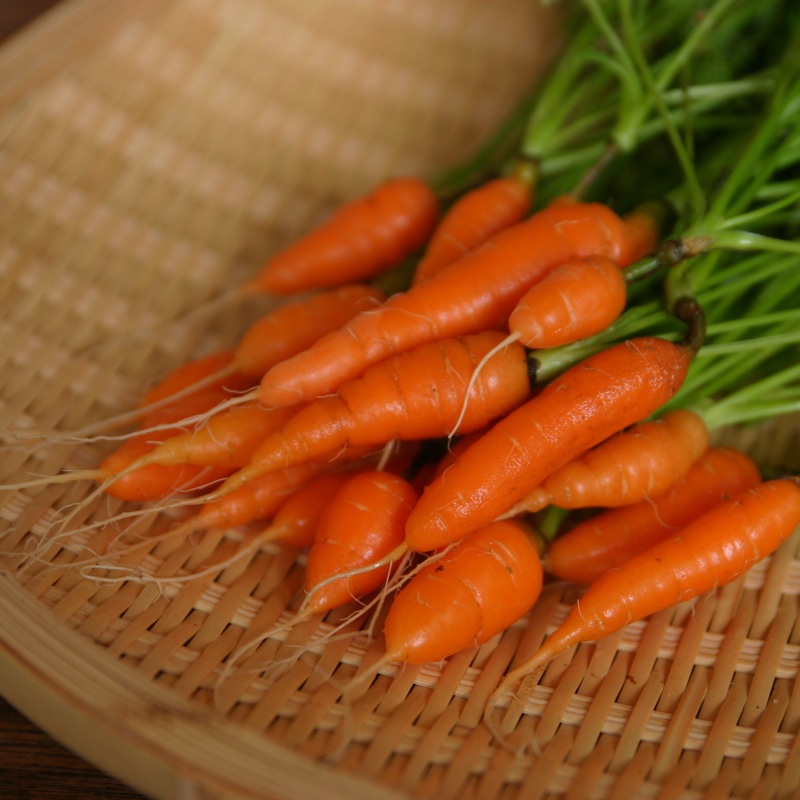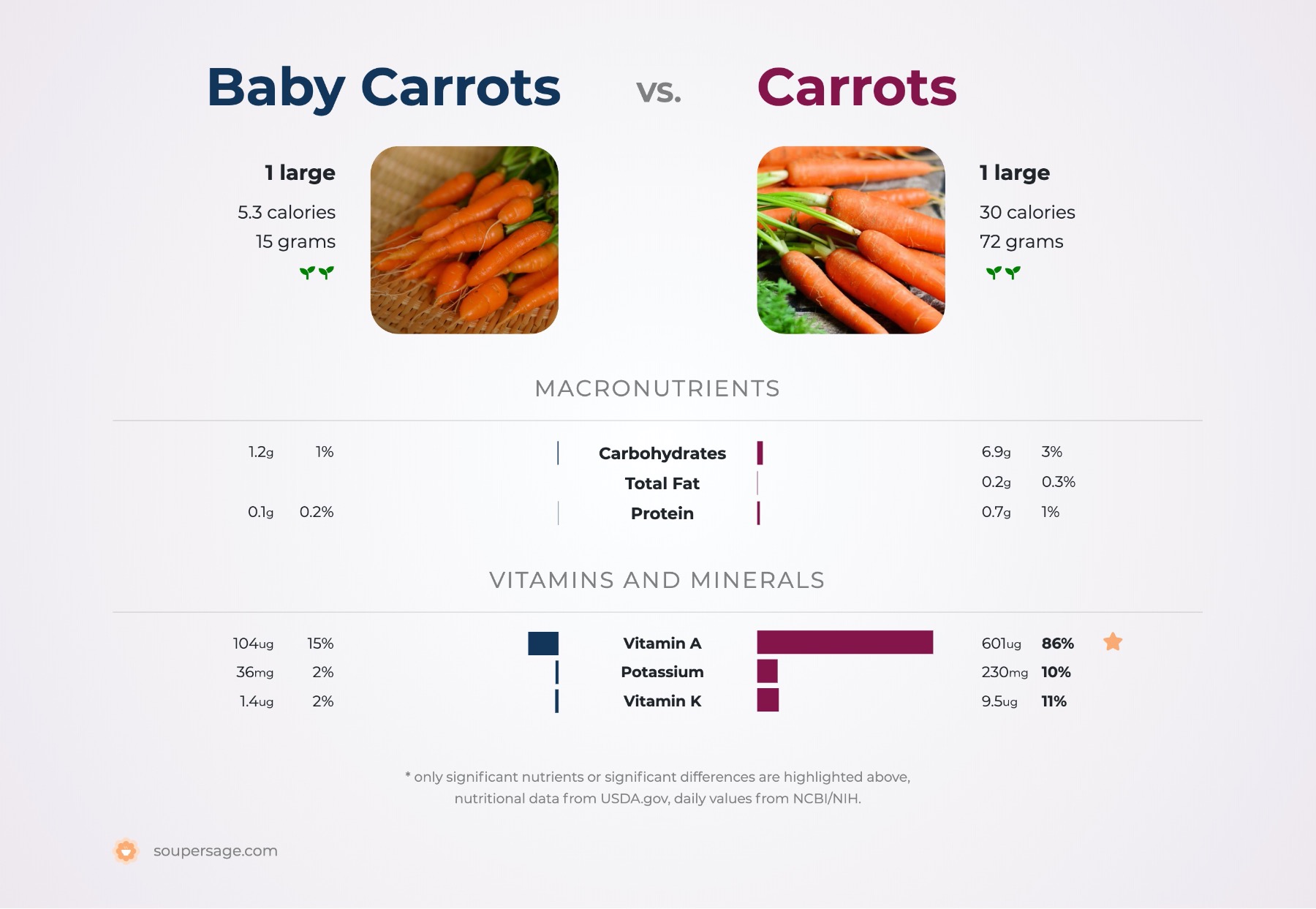Baby Carrots vs. Carrots
Nutrition comparison of Baby Carrots and Carrots
Ever wonder how your favorite foods stack up against each other in terms of nutrition?
We compared the nutritional contents of
baby carrots
versus
carrots
(100g each)
below using 2020 USDA and NIH data[1].
For a quick recap of significant nutrients and differences in baby carrots and carrots:
- Both baby carrots and carrots are high in Vitamin A, dietary fiber and potassium.
USDA sources for nutritional information: Baby Carrots (Carrots, baby, raw) and Carrots (Carrots, raw) . Have a correction or suggestions? Shoot us an email.
Calories and Carbs
calories
Baby carrots and carrots contain similar amounts of calories - baby carrot has 35 calories per 100 grams and carrot has 41 calories.
For macronutrient ratios, baby carrots is similar to carrots for protein, carbs and fat. Baby carrots has a macronutrient ratio of 7:91:3 and for carrots, 8:88:4 for protein, carbohydrates and fat from calories.
Macro Ratios from Calories:
| Baby Carrots | Carrots | |
|---|---|---|
| Protein | 7% | 8% |
| Carbohydrates | 91% | 88% |
| Fat | 3% | 4% |
| Alcohol | ~ | ~ |
carbohydrates
Baby carrots and carrots contain similar amounts of carbs - baby carrot has 8.2g of total carbs per 100 grams and carrot has 9.6g of carbohydrates.
The carbs in baby carrots are made of 62% sugar and 38% dietary fiber, whereas the carbs in carrots comprise of 53% sugar, 31% dietary fiber and 16% starch.
dietary fiber
Both baby carrots and carrots are high in dietary fiber. Baby carrot has a little more dietary fiber (4%) than carrot by weight - baby carrot has 2.9g of dietary fiber per 100 grams and carrot has 2.8g of dietary fiber.
sugar
Baby carrots and carrots contain similar amounts of sugar - baby carrot has 4.8g of sugar per 100 grams and carrot has 4.7g of sugar.
Protein
protein
Baby carrots and carrots contain similar amounts of protein - baby carrot has 0.64g of protein per 100 grams and carrot has 0.93g of protein.
Fat
saturated fat
Both baby carrots and carrots are low in saturated fat - baby carrot has 0.02g of saturated fat per 100 grams and carrot has 0.03g of saturated fat.
Vitamins
Vitamin C
Carrot has 127% more Vitamin C than baby carrot - baby carrot has 2.6mg of Vitamin C per 100 grams and carrot has 5.9mg of Vitamin C.
Vitamin A
Both baby carrots and carrots are high in Vitamin A. Carrot has 21% more Vitamin A than baby carrot - baby carrot has 690ug of Vitamin A per 100 grams and carrot has 835ug of Vitamin A.
Vitamin E
Carrot has more Vitamin E than baby carrot - carrot has 0.66mg of Vitamin E per 100 grams and baby carrot does not contain significant amounts.
Vitamin K
Baby carrots and carrots contain similar amounts of Vitamin K - baby carrot has 9.4ug of Vitamin K per 100 grams and carrot has 13.2ug of Vitamin K.
The B Vitamins
Both baby carrots and carrots contain significant amounts of thiamin, riboflavin, niacin, pantothenic acid, Vitamin B6 and folate.
| Baby Carrots | Carrots | |
|---|---|---|
| Thiamin | 0.03 MG | 0.066 MG |
| Riboflavin | 0.036 MG | 0.058 MG |
| Niacin | 0.556 MG | 0.983 MG |
| Pantothenic acid | 0.401 MG | 0.273 MG |
| Vitamin B6 | 0.105 MG | 0.138 MG |
| Folate | 27 UG | 19 UG |
Minerals
calcium
Baby carrots and carrots contain similar amounts of calcium - baby carrot has 32mg of calcium per 100 grams and carrot has 33mg of calcium.
iron
Baby carrot has 197% more iron than carrot - baby carrot has 0.89mg of iron per 100 grams and carrot has 0.3mg of iron.
potassium
Both baby carrots and carrots are high in potassium. Carrot has 35% more potassium than baby carrot - baby carrot has 237mg of potassium per 100 grams and carrot has 320mg of potassium.
Antioxidants and Phytonutrients
carotenoids
Carotenoids are micronutrients commonly found in plants and some animal products. An example is beta-carotene, the notable carotenoid which is a popular source of Vitamin A.[4][5]
For specific types of carotenoids, both baby carrots and carrots contain significant amounts of beta-carotene, alpha-carotene and lutein + zeaxanthin.
| Baby Carrots | Carrots | |
|---|---|---|
| beta-carotene | 6391 UG | 8285 UG |
| alpha-carotene | 3767 UG | 3477 UG |
| lutein + zeaxanthin | 358 UG | 256 UG |
| lycopene | ~ | 1 UG |
Omega-3 and Omega-6
omega 3s
For omega-3 fatty acids, both baby carrots and carrots contain small amounts of alpha linoleic acid (ALA).
| Baby Carrots | Carrots | |
|---|---|---|
| alpha linoleic acid | 0.008 G | 0.002 G |
| Total | 0.008 G | 0.002 G |
omega 6s
Comparing omega-6 fatty acids, both baby carrots and carrots contain significant amounts of linoleic acid.
| Baby Carrots | Carrots | |
|---|---|---|
| linoleic acid | 0.057 G | 0.1 G |
| Total | 0.057 G | 0.1 G |
Customize your serving size
The comparison below is by weight, but sometimes 100g isn't that intuitive of a measurement for food. View a custom portion comparison (e.g. cups, oz, package).
You can try adding or subtracting the amount of either Baby Carrots or Carrots .
Note: The specific food items compared are: Baby Carrots (Carrots, baby, raw) and Carrots (Carrots, raw) .
Baby Carrots g
()
|
Daily Values (%) |
Carrots g
()
|
|||||
|---|---|---|---|---|---|---|---|
| KCAL % |
|
5% | calories | 5% |
|
KCAL % | |
| G % |
|
5% | carbohydrates | 5% |
|
G % | |
| G % |
|
5% | dietary fiber | 5% |
|
G % | |
| G | 5% | sugar | 5% | G | |||
| G % |
|
5% | total fat | 5% |
|
G % | |
| G % |
|
5% | saturated fat | 5% |
|
G % | |
| G | 5% | monounsaturated fat | 5% | G | |||
| G | 5% | polyunsaturated fat | 5% | G | |||
| G | 5% | trans fat | 5% | G | |||
| MG | 5% | cholesterol | 5% | MG | |||
| MG % |
|
5% | sodium | 5% |
|
MG % | |
| 5% | Vitamins and Minerals | 5% | |||||
| UG % |
|
5% | Vitamin A | 5% |
|
UG % | |
| MG % |
|
5% | Vitamin C | 5% |
|
MG % | |
| IU % |
|
5% | Vitamin D | 5% |
|
IU % | |
| MG % |
|
5% | calcium | 5% |
|
MG % | |
| MG % |
|
5% | iron | 5% |
|
MG % | |
| MG % |
|
5% | magnesium | 5% |
|
MG % | |
| MG % |
|
5% | potassium | 5% |
|
MG % | |
| MG % |
|
5% | thiamin (Vit B1) | 5% |
|
MG % | |
| MG % |
|
5% | riboflavin (Vit B2) | 5% |
|
MG % | |
| MG % |
|
5% | niacin (Vit B3) | 5% |
|
MG % | |
| MG % |
|
5% | Vitamin B6 | 5% |
|
MG % | |
| MG % |
|
5% | pantothenic acid (Vit B5) | 5% |
|
MG % | |
| UG % |
|
5% | folate (Vit B9) | 5% |
|
UG % | |
| UG % |
|
5% | Vitamin B12 | 5% |
|
UG % | |
| MG % |
|
5% | Vitamin E | 5% |
|
MG % | |
| UG % |
|
5% | Vitamin K | 5% |
|
UG % | |
| G % |
|
5% | protein | 5% |
|
G % | |
| UG % |
|
5% | biotin (Vit B7) | 5% |
|
UG % | |
| MG % |
|
5% | choline | 5% |
|
MG % | |
| MG % |
|
5% | chlorine | 5% |
|
MG % | |
| UG % |
|
5% | chromium | 5% |
|
UG % | |
| MG % |
|
5% | copper | 5% |
|
MG % | |
| UG % |
|
5% | fluoride | 5% |
|
UG % | |
| UG % |
|
5% | iodine | 5% |
|
UG % | |
| MG % |
|
5% | manganese | 5% |
|
MG % | |
| UG % |
|
5% | molybdenum | 5% |
|
UG % | |
| MG % |
|
5% | phosphorus | 5% |
|
MG % | |
| UG % |
|
5% | selenium | 5% |
|
UG % | |
| MG % |
|
5% | zinc | 5% |
|
MG % | |
| G | 5% | Water | 5% | G | |||
| G | 5% | Starch | 5% | G | |||
| G | 5% | Alcohol | 5% | G | |||
FAQ
Does baby carrots or carrots contain more calories in 100 grams?Baby carrots and carrots contain similar amounts of calories - baby carrot has 35 calories in 100g and carrot has 41 calories.
Does baby carrots or carrots have more carbohydrates?
By weight, baby carrots and carrots contain similar amounts of carbs - baby carrot has 8.2g of carbs for 100g and carrot has 9.6g of carbohydrates. the carbs in baby carrots are made of 60% sugar and 40% dietary fiber, whereas the carbs in carrots comprise of 50% sugar, 30% dietary fiber and 20% starch.
Does baby carrots or carrots contain more potassium?
Both baby carrots and carrots are high in potassium. Carrot has 40% more potassium than baby carrot - baby carrot has 237mg of potassium in 100 grams and carrot has 320mg of potassium.


